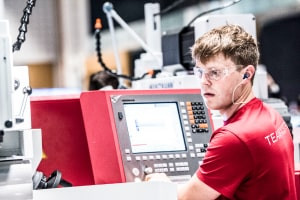Have you ever wondered how to use automation in the manufacturing industry? The primary objective of an automated manufacturing system (AMS) is to drive greater efficiency by either enhancing production capacity or reducing the cost of manufacturing. This course aims at illustrating the ever-growing use of automation in the industrial sector. Study the actual definitions of ‘automation’, ’manufacturing’ and ‘mechatronics’ and the various elements involved in production system facilities. We will reveal the different classifications of manufacturing support systems and the significance of automation in the product life cycle to beat the challenges of the manufacturing market. This process includes differentiating multiple manufacturing systems to ascertain the need to move towards digital automated mechanisms. Discover the mechanical ‘spring system’ functionality by understanding how physics plays a central role in how the machinery performs its duties. You will comprehend how systems integration benefits product development by being better and more efficient and will help the end consumer with a top-quality product.
This video-based course studies the basic concepts of automation in manufacturing. First, we identify the key elements of production system facilities for employing various manufacturing support systems (MSS) in the automation process of the product life cycle. Secondly, we explore the different building blocks of an automated mechatronic-based system. With this background, you will study how the flexible manufacturing system method helps factories quickly adapt to product variance and quantity fluctuations. We then incorporate utilising various machining equipment to take care of the manufacturing operations. You will also study the role of material handling systems (MHS) and auxiliary equipment in performing multiple tasks at logistics worksites. Following this, you will examine how pre-programmed CNC machining computer software dictates the movement of factory tools and machinery, including the process for controlling a range of complex machinery, from grinders and lathes to mills and routers. Lastly, we present graphical examples of existing industrial mechatronic robots like the Selective Compliance Assembly Robot Arm (SCARA). These are implemented in the manufacturing business to fulfil product or material transportation, high precision assembly and continuous welding work.
By the end of this course, you will have a clear understanding of the role of automation in the manufacturing business. This expertise includes learning the advantages that carry the implementation of ‘self-acting’ machines to enhance the performance in the manufacturing operations in terms of variety and quality of the end product. Subsequently, the usefulness of computer numerical control (CNC) technology in manufacturing processes is widely employed in the tools room of the mechanical industry. Finally, you will learn about the elements and the key functionalities of various CNC machine tools such as tool magazines, industrial conveyors, automated storage and retrieval systems and industrial robotic machines. The course provides all the essential information required for designing a mechatronic system and the material to equip you with the knowledge necessary for managing the demands of the facilities in the factory in terms of layout, equipment and processes. Learn how automation is developing the mechatronics of the manufacturing industry by taking this course. So enrol today!
What You Will Learn In This Free Course
View All Learning Outcomes View Less All Alison courses are free to enrol, study, and complete. To successfully complete this Certificate course and become an Alison Graduate, you need to achieve 80% or higher in each course assessment.
Once you have completed this Certificate course, you have the option to acquire an official Certificate, which is a great way to share your achievement with the world.
Your Alison certificate is:
- Ideal for sharing with potential employers.
- Great for your CV, professional social media profiles, and job applications.
- An indication of your commitment to continuously learn, upskill, and achieve high results.
- An incentive for you to continue empowering yourself through lifelong learning.
Alison offers 2 types of Certificate for completed Certificate courses:
- Digital Certificate: a downloadable Certificate in PDF format immediately available to you when you complete your purchase.
- Physical Certificate: a physical version of your officially branded and security-marked Certificate
All Certificate are available to purchase through the Alison Shop. For more information on purchasing Alison Certificate, please visit our FAQs. If you decide not to purchase your Alison Certificate, you can still demonstrate your achievement by sharing your Learner Record or Learner Achievement Verification, both of which are accessible from your Account Settings.












 Avg. Hours
Avg. Hours  Contains Video
Contains Video  CPD Accredited
CPD Accredited 
 Total XP:
Total XP: 
 Knowledge & Skills You Will Learn
Knowledge & Skills You Will Learn 







